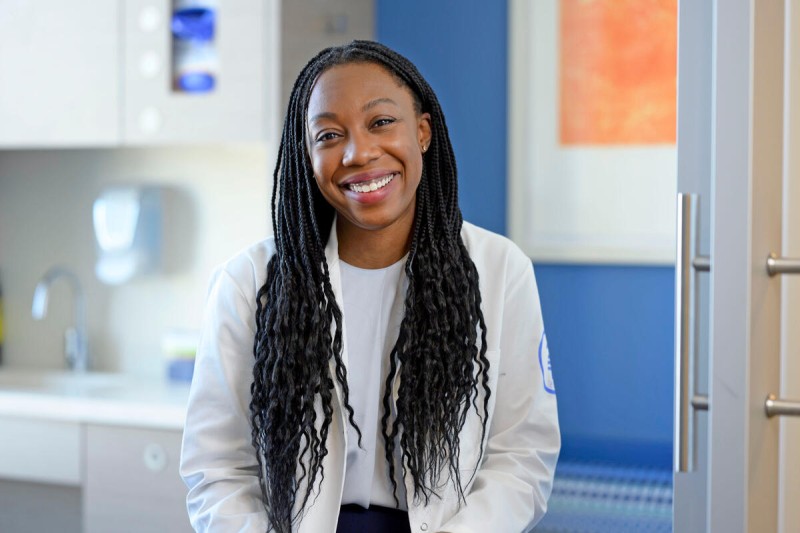
Lung cancer screening catches the disease at an early stage, when it can be cured.
Why Lung Cancer Screening Matters
“The whole point of screening is to catch the cancer at its earliest stage, before there are symptoms,” Dr. Park says. “Early lung cancer is curable. People should think of this test the same way they think of getting their cholesterol checked, which is something that enables them to intervene early and prevent coronary artery disease.”
According to the International Association for the Study of Lung Cancer, the cure rate for patients diagnosed with stage IA lung cancer — the very form of early stage disease that screening was designed to detect — is more than 75% over a five-year period.
Lung cancer screening is recommended even if you no longer smoke.
Based on the research, screening is recommended not only for current smokers but also for former smokers, depending on the extent of their tobacco exposure.
MSK follows the latest recommendation for lung cancer screening from the American Cancer Society. The type of screening you have and your screening schedule are based on your personal risk for lung cancer.
MSK recommends you get screened every year if you are between the ages of 50 and 80 and:
- Smoke now or used to smoke.
- Have smoked an average of one pack a day for 20 years or the equivalent number of cigarettes. For example, you could have smoked two packs a day for 10 years or a half pack a day for 40 years.
Lung cancer screening is covered by insurance.
After the NEJM study, screening experts realized that the test was beneficial for the high-risk study population of people who currently and formerly smoked. Lung cancer screening with CT scans is recommended for these patients and is covered by Medicare and Medicaid, as well as by most insurance companies.
MSK experts recommend that people undergo annual low-dose CT scans for as long as they meet the screening requirements.
Risk from radiation exposure is low and is far outweighed by the benefits of lung cancer screening.
The low-dose CT scans that are used for lung cancer screening have about five times less radiation than conventional CT scans. For the average person, even a regular CT scan is associated with a very small risk of possibly developing a future cancer — perhaps about 0.05%, or about one in 2,000. For people who meet lung cancer screening requirements, that potential risk is far outweighed by the benefit of catching lung cancer early, when it is easier to treat.
Furthermore, the test does not require an IV or any injections of contrast dye. There is no preparation, and you can eat normally before your scan.
False positives from lung cancer screening rarely lead to surgery.
How Lung Cancer Screening Works at MSK
”With any screening test, there is a small risk of a false positive,” Dr. Chidi says. “With lung cancer screening, we sometimes find nodules on a CT scan that look suspicious but may not be a cancer. Most of the time, the next best step is to get an additional scan in a few months. Feel free to ask your MSK provider about your risk for false positives during your screening visit.”
Dr. Park adds that the chance that someone will undergo a surgical intervention such as a biopsy for something that is not cancer is less than 5%.
Lung cancer screening at MSK is quick and requires only one visit.
“We’re all busy, and this can feel like one more thing you have to fit into your schedule,” Dr. Park says. Undergoing the screening may require some effort, he adds, because at some centers it requires two appointments. However, at MSK, only one visit is required.
Before having the scan, you’ll first meet with a licensed independent practitioner (a nurse practitioner, doctor, or physician’s assistant) to ensure that you are eligible and without symptoms of more advanced disease, and to answer any questions and concerns. At MSK, people who qualify for screening can have the test immediately.
The actual screening process takes only a few minutes, Dr. Park says, and results are usually available within 24 hours.
Dr. Park says he believes that the biggest barrier to undergoing screening may be anxiety.
“People are very afraid that something will be found,” he says. “They’re anxious leading up to the test and until the moment that I tell them that everything is OK. It’s important to emphasize that the vast majority of people who undergo the screening don’t have any findings of cancer, but for those who do, this test can save their lives.”
To learn about making an appointment with MSK’s lung cancer screening program, call 646-497-9163. MSK offers screening appointments at most locations in Manhattan, Nassau, Commack, Basking Ridge, Bergen, Monmouth, and Westchester.




